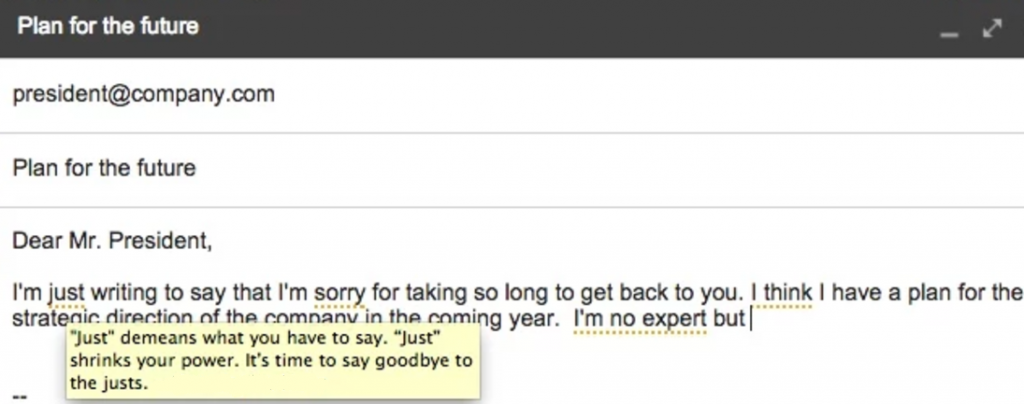By Kathleen Murphy
I’m sorry, did I just hear that right?
A new app for Gmail called Just Not Sorry has been getting a lot of attention on popular news programs such as The Today Show, Salon and NPR. The app was developed by Tami Reiss, CEO of Cyrus Innovation. Ms. Reiss said the app is aimed at women who, in their emails, use what she calls “undermining words,” such as “sorry” and “just.” When a user types these words, they get underlined in red as if they were misspelled. In a post on Medium.com, Reiss frames this as a service to women because such words sabotage their authority.
So, we’re supposed to believe that certain words are limiting women? And that if we just really try to eliminate these words from our discourse women’s opportunities in life will be greatly improved? I’m sorry, but… no… just no.

In her Washington Post article, Jessica Grose the editor of Lenny, an email newsletter from Lena Dunham, and author of Sad Desk Salad states, “In the past couple of years, speech and language patterns associated with women have been subject to increased and unwarranted scrutiny: not just those “undermining” words, but also upspeak (a rising intonation at the end of a sentence) and vocal fry (an unnaturally low, creaky voice). But I’m not even convinced that women use these modes of speaking more than men do… Maybe if their communications weren’t constantly picked apart, even by well-meaning observers, they’d have more of the deeply felt confidence they need to succeed.”
Linguist Debbie Cameron points out that apps like Just Not Sorry and other speech-policing movements like #BanBossy are based on information and ideas that are entirely false. She is quoted in New York Magazine’s blog ‘The Cut,’ as saying, “We’ve learned that some of the most enduring beliefs about the way women talk are not just over-generalizations, they are — to put it bluntly — lies.”
The larger problem with these movements is that they don’t address real, well-researched issues that impact a woman’s quality of life – issues that often have policy solutions. Instead, they perpetuate the idea that there are these mysterious, recalcitrant forces in our patriarchal society working to undermine women’s opportunities and security. The basis for these movements is, at best, inaccurate science. At worst, it is calculated misdirection intended to distract us from the very real obstacles to women’s progress and to create a need for a societal “protector” of women (a role big government types are more than happy to play).
Do real threats to women’s advancement and security exist? Yes. But, there is no mystery about how many of these social conditions can be improved.
Anyone who is truly pro-woman should ditch the cute hashtag campaigns and forget the annoying word-policing apps. Instead, take a good hard look at what’s really holding women back: a government that discourages job-creation through over-regulation and taxation; a government that dis-incentivizes the family; a government that subsidizes an inherently flawed education system; a government that advances a costly and ineffective healthcare system.
Public policy has a direct and real impact on women’s lives. Unfortunately, a majority of the policies currently in place were established by a political ruling class who think they know how to run your life better than you do. The good news is that with new leadership those policies can be changed. With our advocacy, a real pro-women agenda can be put into place.
Let’s be clear. A woman who censors her own speech to conform to some pop-movement is hardly a feminist. A woman who insists that other women censor their speech to conform to that pop-movement is not “pro-woman.” A feminist is a woman who lives the life she chooses. A feminist is a woman who uses her voice – her own, authentic voice – to advocate the ideas that lift all women – and men – up, so they can best find and use their God-given gifts, so that they can live the lives they choose. Those ideas are – and always have been – the time tested principles of liberty, independence and economic freedom.
So, sorry, word-police, but you’re not solving any real problems. We just don’t need – or want – your ludicrous app or your limiting ideas.
Kathleen Murphy is the Director of Communication for The Illinois Opportunity Project.





